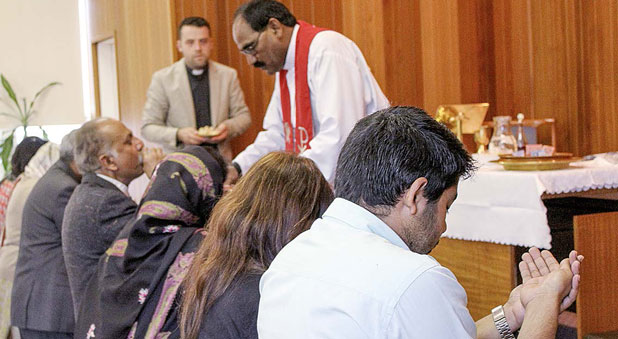A Pakistani minister in Australia as a refugee has begun an Urdu-speaking congregation based at St Mark’s, Revesby.
The Rev Ijaz Gill, who served as the vicar of All Saints’ Anglican Church in Peshawar, was forced to leave the country after death threats from the Taliban. He was a survivor of the bomb blasts that hit the church in late 2013 and was further hounded after continuing to preach publicly.
His outreach through a sticker ministry – similar to bumper bar stickers in Australia – was specifically referenced in a death threat letter he received.
“My bishop [the Right Rev Humphrey Peters, Bishop of Peshawar] was telling me I was not safe, he was supporting me and my family with a house,” Mr Gill says.
“I spent a month living in Dubai and applied to many places – Germany, England, Australia. I came to Sydney but my experience was very difficult here... no good friends I know here. It was hard.”
Mr Gill has been in the country for eight months, spending time in several suburbs and churches in Sydney. He eventually arrived at Revesby with the support of former CMS missionary to Pakistan the Rev John Bales, Bishop Peter Tasker and the rector of Revesby, the Rev John Bartik.
Since arriving at Revesby Mr Bartik encouraged Mr Gill to use his experience and gifts to begin an Anglican congregation for Urdu speakers. The congregation began in April and attracts 30 to 50 people on any given week, most of whom had no previous connection with the Revesby church.
The service follows an Urdu-language Anglican liturgy, with Mr Bartik presiding over some elements of the service while Mr Gill awaits a licence from the Diocese.
“I took Ijaz to meet Bruce Hall, and on the way home Ijaz asked me why there wasn’t an Urdu Anglican service,” Mr Bartik says. “There are several other Urdu services in other traditions, but no specifically Anglican one. So I just said, ‘Alright Ijaz, start one! You can do it.’
“It was a lightbulb moment. We got home and he just went to town, calling people, and they all turned up at once.“
Mr Bartik says that apart from the obvious value of having a space for Urdu speakers in his church to meet and worship together, it has also been a boon for Mr Gill, who can now continue his ministry in a new country.
“It’s had a big effect on him personally, being useful and making the most of his gifts, even though he’s in a different country,” Mr Bartik says. “When I first met him, my first impression was that he was in this deep sadness that wasn’t going to go away. He knew no one apart from his wife; his children were in Pakistan; he had left home under threat of violence – there was that trauma there. But in that first service, I hadn’t seen him more happy.
“It has also allowed for connections with other Urdu-speaking Anglicans from similar backgrounds. So many of the people in this congregation left Pakistan in similar circumstances and have families back home or in other locations, going through refugee processing of some sort.”
Mr Gill says the experience has humbled him, moving from a relatively important position in the church in Pakistan to beginning again in a new country, with a new language and new partners in gospel work.
“In Pakistan, my lifestyle is different,” he says. “I have a driver, I have a person who cleaned my house, I have a verger who would iron my cassock. I have three assistants, I am area dean, assistant to the bishop, it was very different.
“Life is different. I talk to my bishop in Pakistan, he says I am king in Peshawar – but I am not king in Sydney.
“God blesses me, God gives fruit. God humbles and he provides everything we have. I give thanks to him for what I have here.”
Photo: Ijaz Gill (centre) and John Bartik (back) preside over Communion at the new service.
























